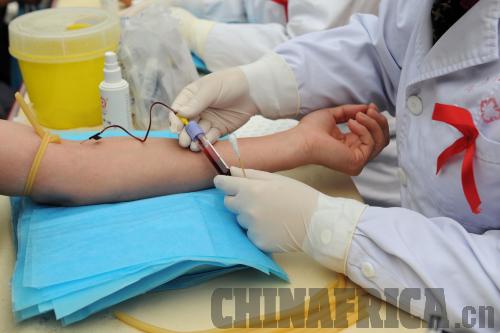|
 |
|
BLOOD WORK: A doctor tests for AIDS in Chongqing (CHEN CHENG) |
"I am living with HIV. Could you please give me a smile and a hug?" That's the wording emblazoned on Yang Kaiyu's T-shirt as he chats to pedestrians on Chengdu City's busy Chunxu Road and asks if they want to take a photo with him. The Sichuan University student is promoting the fact that people living with HIV are of no threat to society.
"Less than one third of pedestrians would like to hug me and those who want to take photos with me are even fewer," Yang told the Tianfu Morning Post, adding that some people just ran away when they saw his T-shirt. He said he and other volunteers are not actually living with HIV, but are trying to raise awareness that this group of people cause no harm to the society.
Though it is widely publicized that HIV is only spread through unprotected sexual intercourse, blood transfusion and mother-to-child prenatal transmission, and that it is safe to shake hands, hug, share food and have general contact with people living with HIV/AIDS, many people still show extreme fear to people living with HIV/AIDS.
Now in its fifth year, the street event has gained momentum and more people are aware of the AIDS-related information, said Yang.
Discrimination still exists
Despite these publicity efforts, discrimination against people living with HIV/AIDS is still common in China. In the past couple of years, there are three cases in China where people living with HIV were refused admission to become teachers, because of their HIV status.
"I am not sure whether I can win the lawsuit; I just want to take this opportunity to speak out and say that a HIV positive person does not threaten anybody in daily life or work," said Xiao Hai (not his real name), one of the people who filed a lawsuit against the discrimination. Like Xiao Hai, many people living with HIV/AIDS are standing up for their rights in recent years.
But Xiao Hai's hope of winning the lawsuit is very slim. Though China has a series of laws and regulations defending the equal rights of people living with HIV/AIDS, such as the Regulations on the Prevention and Treatment of HIV/AIDS promulgated in 2006 and the Employment Promotion Law issued in 2008, some regulations still encourage discrimination upon persons with HIV/AIDS. For instance, the General Standards of Medical Checkup for Public Servant Recruitment issued in 2005, based on which Xiao Hai was rejected, listed people living with HIV/AIDS as unqualified candidates.
"We certainly believe that people should never be refused employment on the ground of their HIV status alone because they are a threat to nobody in daily life, just like people with diabetes or high blood pressure [threatening no one]," Guy Taylor, Program Associate for Advocacy and Information Management of Joint United Nations Program on HIV/AIDS (UNAIDS), told ChinAfrica. According to him, the standards should be revised because the Regulations on the Prevention and Treatment of HIV/AIDS were issued by the State Council and the Employment Promotion Law was promulgated by the National People's Congress (NPC), both organizations higher than the Ministry of Health and Ministry of Human Resources and Social Security that issued the standards. "The lower level standards should be subject to higher level laws and regulations and should definitely be revised," said Taylor.
But he also admitted that though some of the laws in China are good, the implementation is quite difficult. Of the three people with HIV suing local authorities for their equal rights, two have lost their lawsuits.
|